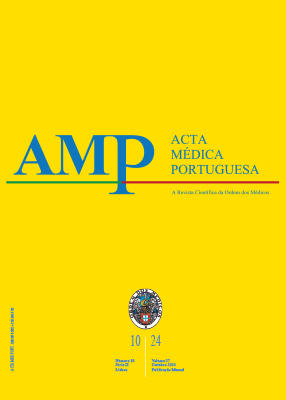Assessing the Burden of Atopic Dermatitis in Portugal through Patient-Centered Experiences
DOI:
https://doi.org/10.20344/amp.21248Keywords:
Cost of Illness, Decision Making, Shared, Dermatitis, Atopic/epidemiology, Dermatitis, Atopic/therapy, Patient Education, Portugal, Quality of LifeAbstract
Introduction: Adult patients and caregivers of children with atopic dermatitis experience high physical, mental, and financial burden in Portugal. We outline the experience of atopic dermatitis management and how the current medical care model impacts patient-centered concerns such as financial burden, quality of life, disease burden, and treatment satisfaction.
Methods: We conducted a survey of 419 Portuguese adults and caregivers of children to capture the experience of managing atopic dermatitis in Portugal.
Results: Respondents reported average satisfaction with treatment, with a mean satisfaction rating of 3.15/5.00 (SD = 0.77). Adults reported slightly better control of atopic dermatitis symptoms (mean = 56.6) than pediatric patients (mean = 55.9, caregiver reported). Nearly 34% of adults and 39% of caregivers of children and adolescents indicated that their healthcare providers asked about their priorities at the last medical visit. Additionally, only 40% of adult patients and 32% of caregivers reported that patient training was offered to them. Respondents seeing dermatologists reported higher satisfaction than those seeing other healthcare providers (p = 0.01) but there were no differences in long-term control of symptoms by provider type (p = 0.85) when controlling for severity. Portuguese adult patients scored 0.86/1.00 on the EQ-5D (where 0 = death and 1 = perfect health). Financial concern was high as nearly 80% of patients and caregivers reported using savings, borrowing money, and/or reducing spending to cover atopic dermatitis-related costs.
Conclusion: Portuguese patients with atopic dermatitis and caregivers experience financial burden, lower health-related quality of life, higher disease burden, and treatment satisfaction issues with their current medical care. These factors often deteriorate as the disease’s severity increases. Providers, researchers and policymakers should focus on better addressing patient-centered concerns for individuals suffering from atopic dermatitis to improve care and health outcomes.
Downloads
References
Barbarot S, Auziere S, Gadkari A, Girolomoni G, Puig L, Simpson D, et al. Epidemiology of atopic dermatitis in adults: results from an international survey. Allergy. 2018;73:1284-93.
Coelho P, Alpalhão M, Victorino G, Camilo J, Cardoso C, Maia Silva J. Understanding the impact of atopic dermatitis in Portuguese patients: results from an analytical observational study. Value Health. 2022;25:S232.
Carvalho D, Aguiar P, Mendes-Bastos P, Palma-Carlos A, Freitas J, Ferrinho P. Quality of life and characterization of patients with atopic dermatitis in Portugal: the QUADEP study. J Investig Allergol Clin Immunol. 2020;30:430-8.
Capozza K, Funk M, Hering M, Lang J, Merhand S, Manion R, et al. Patients’ and caregivers’ experiences with atopic dermatitis-related burden, medical care, and treatments in 8 countries. J Allergy Clin Immunol Pract. 2023;11:264-73.
Torres T, Gonçalo M, Paiva-Lopes M, Claro C, Varela P, Silva J, et al. Atopic dermatitis: improving patient access to health care in dermatology. Port J Dermatol and Venereol. 2023;81:1-8.
Carvalho D, Aguiar P, Ferrinho P, Mendes-Bastos P, Palma-Carlos A. Eczema and urticaria in the adult population in Portugal: a prevalence study. Actas Dermosifiliogr. 2019;110:744-51.
Eyerich K, Gooderham M, Silvestre J, Shumack S, Mendes-Bastos P, Aoki V, et al. Real-world clinical, psychosocial and economic burden of atopic dermatitis: results from a multicountry study. J Eur Acad Dermatol Venereol. 2023;00:1-14.
Pariser D, Simpson E, Gadkari A, Bieber T, Margolis D, Brown M, et al. Evaluating patient-perceived control of atopic dermatitis: design, validation, and scoring of the Atopic Dermatitis Control Tool (ADCT). Curr Med Res Opin. 2019;36:367-76.
EuroQol Group. EuroQol-a new facility for the measurement of healthrelated quality of life. Health Policy. 1990;16:199-208.
Ferreira L, Ferreira P, Pereira L, Oppe M. EQ-5D Portuguese population norms. Qual Life Res. 2014;23:425-30.
Torres T, Gonçalo M, Paiva-Lopes M, Claro C, Ramos L, Selores M, et al. Portuguese recommendations for the treatment of atopic dermatitis with biologic therapy and JAK inhibitors in adult patients. Drugs Context. 2021;10:2021-9-5.
Hartono SP, Chatrath S, Aktas ON, Kubala SA, Capozza K, Myles IA, et al. Interventions for anxiety and depression in patients with atopic dermatitis: a systematic review and meta-analysis. Sci Rep. 2024;14:8844.
Downloads
Published
How to Cite
Issue
Section
License
Copyright (c) 2024 Acta Médica Portuguesa

This work is licensed under a Creative Commons Attribution-NonCommercial 4.0 International License.
All the articles published in the AMP are open access and comply with the requirements of funding agencies or academic institutions. The AMP is governed by the terms of the Creative Commons ‘Attribution – Non-Commercial Use - (CC-BY-NC)’ license, regarding the use by third parties.
It is the author’s responsibility to obtain approval for the reproduction of figures, tables, etc. from other publications.
Upon acceptance of an article for publication, the authors will be asked to complete the ICMJE “Copyright Liability and Copyright Sharing Statement “(http://www.actamedicaportuguesa.com/info/AMP-NormasPublicacao.pdf) and the “Declaration of Potential Conflicts of Interest” (http:// www.icmje.org/conflicts-of-interest). An e-mail will be sent to the corresponding author to acknowledge receipt of the manuscript.
After publication, the authors are authorised to make their articles available in repositories of their institutions of origin, as long as they always mention where they were published and according to the Creative Commons license.









